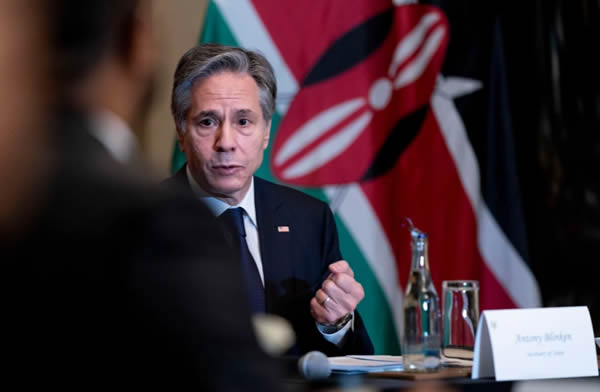
U.S. Secretary of State Antony Blinken met Thursday with China’s top diplomat Wang Yi in Indonesia, discussions the United States said were part of the ongoing effort to ease relations between the two superpowers.
Blinken met with Wang on the sidelines of the Association of Southeast Asian Nations (ASEAN) talks in Jakarta. His goal was to “maintain open channels of communication to clarify U.S. interests across a wide range of issues and to responsibly manage competition by reducing the risk of misperception and miscalculation,” State Department spokesman Matthew Miller said.
“This is what the world expects” of the U.S. and China, Miller said in a statement.
Russian Foreign Minister Sergey Lavrov is also expected to take part in the ASEAN talks.
Blinken and Wang “had candid and constructive discussions on a range of bilateral, regional and global issues, including on areas of difference and potential areas of cooperation,” Miller said, with Blinken emphasizing “the importance of maintaining peace and stability across the Taiwan Strait.”
Blinken, who met with Wang last month in Beijing, “made clear that the United States, together with our allies and partners, will advance our vision for a free, open and rules-based international order,” Miller said.
Blinken’s meeting with Wang is the latest effort by Washington to improve strained relations with Beijing.
In the newest conflict between the U.S. and China, hackers possibly linked to China’s intelligence agencies are being blamed for a monthlong campaign that breached some unclassified U.S. email systems, allowing them to access a small number of accounts at the State Department and a handful of other organizations.
Microsoft first announced the intrusion on Tuesday, attributing the attack on its Outlook email service to Chinese threat actors it dubbed Storm-0558.
The company said in a blog post that the hackers managed to forge a Microsoft authentication token and gain access to the email accounts of 25 organizations in the U.S. and around the globe, starting in mid-May.
At the same time, top U.S. and Chinese officials have stepped up talks. Aside from Blinken’s discussions with Wang, U.S. Treasury Secretary Janet Yellen visited Beijing last week to discuss trade and related issues between the world’s two biggest economies. Next week, John Kerry, the U.S. special envoy on climate issues, will be in China Sunday through Wednesday.
On Thursday, in a joint communique, the ASEAN foreign ministers again condemned the violence in Myanmar and repeated their call for the junta to follow the five-point peace plan that they agreed to shortly after ousting Aung San Suu Kyi’s government in early 2021.
The ministers also expressed concerns related to the South China Sea, including “land reclamations, activities, serious incidents in the area, including actions that put the safety of all persons at risk.”
The ASEAN-crafted plan includes a call for an immediate halt to violence, delivery of humanitarian aid and peace talks.
The violence in Myanmar has displaced more than 1 million people, according to the United Nations.
Lucas Myers, senior associate for Southeast Asia at the Wilson Center, told VOA that ASEAN members are divided over whether and how to deal with Myanmar’s military rulers.
“So, the maritime states — Indonesia, Malaysia, Singapore, Philippines — are much more pro-democracy in the Myanmar crisis, whereas mainland states, which are oftentimes more autocratic in this case, are much more in favor of the junta [ruling Myanmar],” Myers said.
VOA Senior Diplomatic Correspondent Cindy Saine contributed to this report. Some information came from The Associated Press, Agence France-Presse and Reuters.
Source: voanews.com























